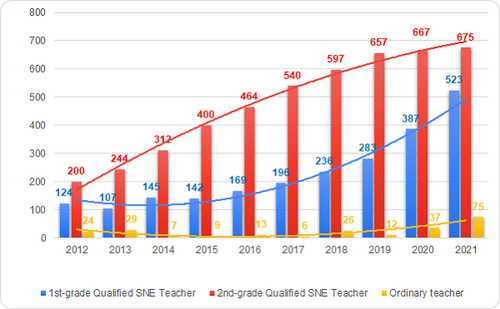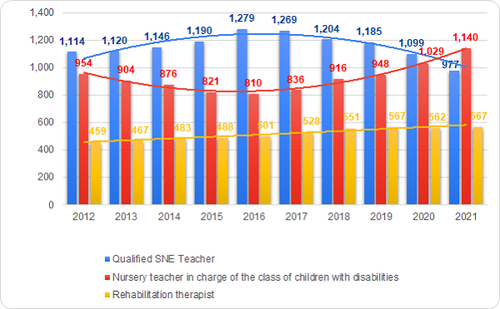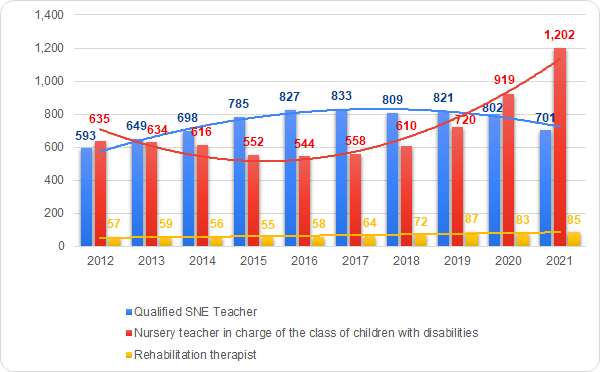In the previous article, I explained the characteristics and issues of inclusive education systems in South Korea, using statistical data and examples of actual facilities for children with disabilities. As I have explained previously, preschool facilities are roughly divided into kindergartens and nursery schools in South Korea. Each category requires different teaching certifications. For example, kindergartens require a "formal teaching certification for kindergartens" issued by the Ministry of Education. In contrast, nursery schools require a "nursery teacher certification" issued by the Ministry of Health and Welfare. The same can apply to inclusive education. Required qualifications and conditions for teaching children with disabilities differ, depending on the relevant competent authorities.
In this article with the theme "Current Situation and Issues of Inclusive Education for Preschool Children in South Korea - II," I will discuss these differences and related issues. More precisely, I will explain systems for a "Formal Teaching Certification for Special Schools" issued by the Ministry of Education and a "Nursery Teacher Certification Specialized in Children with Disabilities" issued by the Ministry of Health and Welfare. I will also show the actual allocation trend of teachers in both categories.
1. Qualification for teaching children with disabilities at kindergartens and nursery schools
First of all, to teach children with disabilities in kindergartens in South Korea, teachers must be qualified as "Formal Kindergarten teachers for Special Schools" ("Qualified SNE Teachers"), which is a 2nd-grade (or above) teaching certification issued by the Ministry of Education.i To acquire this certification, teachers must major in special needs education at education/normal universities and complete at least 80 credits in special needs education and early childhood education (including practical training). In addition, national/public kindergartens set higher standards for Qualified SNE Teachers. Therefore, Qualified SNE Teachers must pass a recruitment examination to work at national/public kindergartens. If those with a formal teaching certification for special schools (kindergartens) do not take the recruitment examination, they can still work at private kindergartens or nursery schools.
In order to teach children with disabilities in nursery schools in South Korea, teachers must obtain either a "Formal Teaching Certification for Special Schools" issued by the Ministry of Education or a "Nursery Teacher Certification Specialized in Children with Disabilities" ("Specialized Nursery Teachers") issued by the Ministry of Health and Welfare. The certification of Specialized Nursery Teachers is a new qualifying standard established under the Public Welfare Act for Children with Disabilities, which was revised in 2012. Since 2016, it has been mandatory for nursery schools for children with disabilities to have Specialized Nursery Teachers assigned. To acquire this certification, teachers should have a 2nd-grade nursery teacher certification or above and have completed at least 16 credits in special needs education or rehabilitation.ii Table 1 below shows the details of these two certifications.
Table 1: Differences between "Qualified SNE Teacher" and "Specialized Nursery Teacher"
| Qualified SNE Teachers (kindergarten) | Specialized Nursery Teachers | |
|---|---|---|
| Authorities in charge | Ministry of Education | Ministry of Health and Welfare |
| Employers | Special schools, special classes operated by kindergartens, specialized nursery schools for children with disabilities, and integrated nursery schools for children with disabilities | Specialized nursery schools for children with disabilities and integrated nursery schools for children with disabilities |
| Qualification criteria | Completion of at least 80 credits, consisting of at least 42 credits in special needs education and 38 credits in ECEC (including practical training) For those studying graduate courses at education universities, completion of at least 30 credits in special needs education |
Qualified as a 2nd-grade (or above) nursery teacher with completion of at least eight subjects (16 credits for those enrolled on or before August 4, 2012, and 24 credits for those enrolled on or after August 5, 2012) in special needs education/rehabilitation (without practical training) |
2. Allocation status of "Qualified SNE Teacher" and "Specialized Nursery Teacher"
Special classes operated by kindergartens must allocate one Qualified SNE Teacher to every four children with disabilities. Likewise, integrated nursery schools have been obliged to allocate one Qualified SNE Teacher or one Specialized Nursery Teacher to every three children with disabilities since 2016. In addition, at least one of every two specialized nursery teachers must qualify as a "Qualified SNE Teacher." Meanwhile, specialized nursery schools for children with disabilities must allocate one specialized nursery teacher to every three children with disabilities. Each time the number of children with disabilities exceeds three, an additional specialized nursery teacher is required, and one out of three specialized nursery teachers must qualify as a "Qualified SNE Teacher."
Considering the above rules, I will discuss the allocation trend and issues of Qualified SNE Teachers and Specialized Nursery Teachers, based on the "Statistics of Special Needs Education" and the "Statistics of Childcare Services" published between 2012 and 2021.
 Figure 1: Number of Qualified SNE Teachers allocated to special classes operated by kindergartens
Figure 1: Number of Qualified SNE Teachers allocated to special classes operated by kindergartens
The number of Qualified SNE Teachers allocated to special classes operated by kindergartens (Figure 1) was 1,198 in 2021 (including 1st-grade and 2nd-grade teachers). As I have explained in the previous article, the number of children with disabilities attending special classes was 4,444 in 2021. Therefore, kindergartens fully comply with the government's allocation rule (i.e., one Qualified SNE Teacher per four children with disabilities). In addition, when looking into the allocation trend by kindergarten type, it is confirmed that four Qualified SNE Teachers are allocated to national kindergartens, 1,192 Qualified SNE Teachers to public kindergartens, and two Qualified SNE Teachers to private kindergartens (Ministry of Education, 2021). These figures suggest that most Qualified SNE Teachers find employment at public kindergartens after passing the recruitment examination. In addition, 356 Qualified SNE Teachers currently work at kindergartens operated by special schools (without inclusive education). After passing the recruitment examination, these teachers are also allocated to national/public schools.
According to the Statistics of Special Needs Education, the number of Qualified SNE Teachers working at special classes operated by kindergartens is steadily increasing. As I have explained in the previous article, this trend probably resulted from introducing and expanding special classes operated by kindergartens under the "Five-Year Education Sector Development Plan for Special Needs Education." However, as I mentioned above, only two Qualified SNE Teachers are currently allocated to private kindergartens. This figure indicates that private kindergartens have not introduced special classes to a sufficient degree. As a result, children with disabilities attending private kindergartens probably do not receive sufficient care. Therefore, every type of kindergarten, especially private kindergartens, must make efforts to urgently introduce and expand their special classes, thereby creating ideal environments for children with disabilities where they can receive appropriate support and care.
 Figure 2: Numbers of Qualified SNE Teachers, nursery teachers in charge of children with disabilities, and rehabilitation therapists allocated to specialized nursery schools for children with disabilitiesiii,iv
Figure 2: Numbers of Qualified SNE Teachers, nursery teachers in charge of children with disabilities, and rehabilitation therapists allocated to specialized nursery schools for children with disabilitiesiii,iv
 Figure 3: Numbers of Qualified SNE Teachers, nursery teachers in charge of children with disabilities, and rehabilitation therapists allocated to integrated nursery schools
Figure 3: Numbers of Qualified SNE Teachers, nursery teachers in charge of children with disabilities, and rehabilitation therapists allocated to integrated nursery schools
According to the statistics regarding specialized nursery schools for children with disabilities and integrated nursery schools, the number of rehabilitation therapists shows no significant difference, while the number of specialized teachers (i.e., Qualified SNE Teachers) has been decreasing gradually since 2018. In contrast, the number of nursery teachers in charge of the class of children with disabilities (i.e., Specialized Nursery Teachers) has continuously increased since 2016 (see Figures 2 and 3).
At integrated nursery schools in particular, the number of Specialized Nursery Teachers almost doubled, compared to ten years ago (2012). This trend is probably due to changes in the allocation system of Specialized Nursery Teachers since 2016 under the Public Welfare Act for Children with Disabilities (revised in 2012). In this regard, the role of Specialized Nursery Teachers will become increasingly important for childcare facilities in the future. It should be noted, however, that, compared to Qualified SNE Teachers, the certification for Specialized Nursery Teachers is relatively easier to acquire without completing practical training; therefore, the standard of this certification still needs to be reviewed and enhanced. In addition, Qualified SNE Teachers tend to avoid nursery schools where inclusive education and longer working hours are prerequisites and prefer kindergartens that offer partially integrated education and shorter working hours. Therefore, it is difficult for nursery schools to employ and retain a sufficient number of Qualified SNE Teachers. To attract Qualified SNE Teachers with more expertise in children with disabilities than Specialized Nursery Teachers, nursery schools should improve working conditions and offer better working conditions.
- i. The certification of formal teaching certification for special schools can be divided into two categories: 1st grade and 2nd grade. The 2nd grade certification can be obtained by those who graduated from a special-needs education department or completed teacher training courses in a special-needs education-related department at education/normal universities. The 1st grade certification can be obtained by those who have at least three years of teaching experience with the 2nd grade certification and completed specific education courses or those who have at least one year of teaching experience and have acquired a master's degree in special needs education at education universities or graduate schools designated by the chief of the Ministry of Education.
- ii. The formal title of a childcare worker working at nursery schools is "nursery teacher" and can be divided into three grades. The 3rd grade certification can be obtained by those who graduated from a high school or equivalent and completed teacher training courses at teacher training schools designated under the Ministry of Health and Welfare ordinance. The 2nd grade certification can be obtained by those who graduated from a junior college or equivalent and completed necessary childcare courses/credits designated under the Ministry of Health and Welfare ordinance or those who have at least two years of childcare experience with the 3rd grade certification. The 1st grade certification can be obtained by those who have at least three years of childcare experience with the 2nd-grade certification and completed necessary courses designated by the chief of the Ministry of Health and Welfare or those who acquired a master's degree from childcare-related graduate schools and have at least one year of childcare experience.
- iii. The Statistics of Childcare Services do not cover the qualification of nursery teachers in charge of the class of children with disabilities. However, nursery schools for children with disabilities have been obligated to retain Qualified SNE Teachers and Specialized Nursery Teachers since 2016. Therefore, it can be assumed that nursery teachers in charge of the class of children with disabilities means Specialized Nursery Teachers in this survey. Therefore, in this article, the term "nursery teachers in charge of the class of children with disabilities" refers to those with the certification of Specialized Nursery Teacher.
- iv. The term "rehabilitation therapist" includes physical therapists, occupational therapists, speech therapists, clinical psychotherapists, and other professionals with national qualifications in related areas, who are in charge of rehabilitating children with disabilities in specialized nursery schools for children with disabilities and integrated nursery schools.
References:
- Ministry of Education, Science, and Technology. "2012 Statistics of Special Needs Education"
- Ministry of Education. "2013-2021 Statistics of Special Needs Education"
- Ministry of Education. "Act on Special Education for Persons with Disabilities"
- Ministry of Education. "Enforcement Ordinance for Act on Special Education for Persons with Disabilities"
- Ministry of Education. "Early Childhood Education Act"
- Ministry of Health and Welfare. "2012-2021 Statistics of Childcare Services"
- Ministry of Health and Welfare. "Act on Welfare Support for Children with Disabilities"
- Ministry of Health and Welfare. "Enforcement Ordinance for the Act on Welfare Support for Children with Disabilities"
- Ministry of Health and Welfare. "Child Care Act"
- 이정림, 김은영, 엄지원, & 강경숙. (2012). 장애 영유아 통합보육· 교육 현황과 선진화 방안 (Current conditions of integrated childcare and education for young children with disabilities and suggestions for advancement).
Assistant Professor, Faculty of Education, Soka University.
Dr. An was born in South Korea and graduated from a Korean university, majoring in early childhood education. After obtaining her doctoral degree (pedagogy) from the Graduate School of Letters, Soka University, she has been engaged in research studies concerning children with disabilities and their families. Her main research topic includes “Interaction with children with/without disabilities and support for nursery teachers in inclusive education settings in South Korea.”
- [South Korea] Current Situation and Issues of Inclusive Education for Preschool Children in South Korea - I
- [Aiming to Realize an Inclusive Society] Providing Inclusive Childcare Means Offering a Wider Variety of Choices for Daily life to All Children
- [Aiming to Realize an Inclusive Society] Shared Practices with Specialists and Parents to Realize Inclusive Childcare
- [Japan] Identifying Factor Structures and Determinants Involved in the Development of "Non" Cognitive Skills in Early Childhood
- [South Korea] Current Situation and Issues of Inclusive Education for Preschool Children in South Korea - II
- A Useful Comparison Table for Improving the Quality of ECEC--International Comparative Study on Free Preschool Education and Childcare (74th OMEP World Assembly and Conference)














